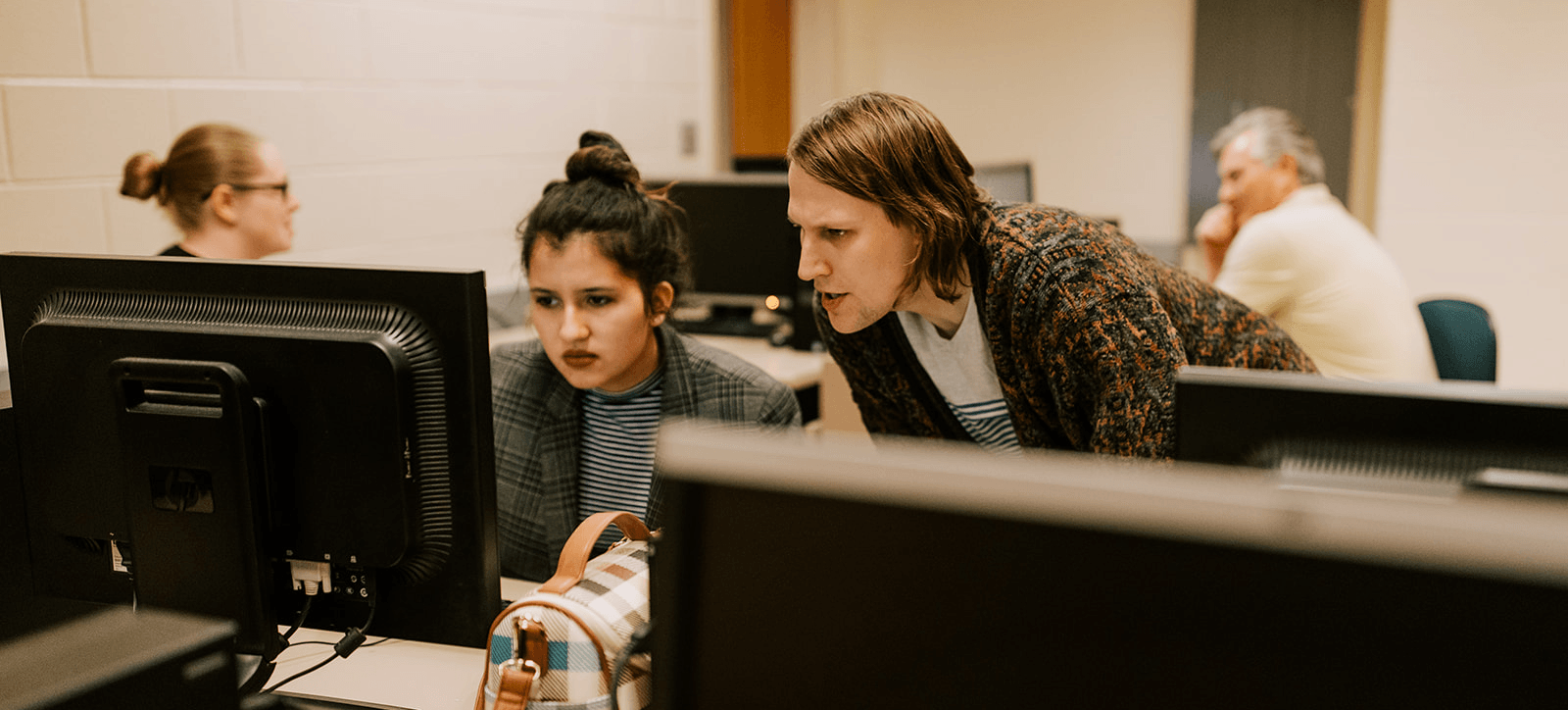Instructor Spotlight: Dee McCormick
February 03, 2021

Since coming to Purdue in 2016, Dee McCormick (they/them) has been an instructor, technology mentor, and online course coordinator for ICaP. McCormick assumed the role of online course coordinator in May 2020. Since then, they have helped ICaP adapt to a new learning management system (Brightspace) and respond to the COVID-19 pandemic. McCormick helped develop the ENGL 106 hybrid course model for both in-person and online teaching, which can be used in the pandemic and beyond.
Summer 2020: ICaP’s Response to COVID-19
As online course coordinator for ICaP, McCormick was charged with leading the delivery of the online version of Purdue’s first-year writing course, which had only recently been developed.
“Teaching online is initially a strange shift to make because so much of writing pedagogy depends on the face-to-face experience of teacher and student,” said McCormick, who first taught online in Summer 2018.
The summer semester is the first time many instructors teach online since so many students are learning from home. Summer 2020 was critical: in addition to being many instructors’ first semester teaching online, it was also their first semester using a new learning management system— Purdue was in the process of shifting from Blackboard to Brightspace. Plus, the COVID-19 pandemic was in full swing. In previous years, ICaP instructors new to online teaching completed an in-person training, but the pandemic necessitated a new approach.
Brightspace LMS Transition and the Hybrid Course Model
McCormick and former ICaP Assistant Director Libby Chernouski developed a training course in Brightspace that familiarized new instructors with both the fundamentals of online teaching and the Brightspace platform. McCormick played a key role in designing and facilitating ICaP’s approach to teaching on Brightspace, meeting with people from Pearson REVEL and Purdue’s Teaching and Learning Technologies to make decisions about how to best manage courses. “I learned a lot about course design, from how to determine a platform’s technological capacity to how to set up guidelines so students and instructors didn’t get confused,” they said.
“When the pandemic hit, we had to figure out what to do with courses that weren’t originally meant to be taught online,” McCormick said. Purdue was investigating a new approach to teaching: the hybrid course model. In determining ICaP’s approach to hybrid teaching, McCormick met with ICaP administrators to examine the necessary institutional parameters and the technological capacity of platforms like Brightspace, Zoom and Pearson REVEL. They developed a brand-new course model: a hybrid version of ENGL 106 that could be delivered both online and in person.
Learning About Problem-Solving as an Institutional Leader
“This role taught me a lot about what a writing program administrator is able to do,” McCormick said. “I got a sense of what it means to manage a program like ICaP— there are things you want to accomplish and limits to how you can accomplish them. You also have to manage people, and I learned a lot about that, too. Because I was leading people in a new approach to online teaching, my role often involved shifting instructors’ understanding and behavior while also leaving room for innovation and variability.”
“I learned a lot about adaptability and how to think through a problem— examining the institutional, technological, and personnel issues that comprise the situation and determining how to serve up a workable solution,” McCormick said.

Teaching Research in First-Year Writing
Now a Ph.D. student in rhetoric and composition, McCormick began teaching first-year writing in 2014 while earning an MA at the University of Louisville. “Because of my prior experience, I came to Purdue with a sense of both who I am as a teacher and how I approach teaching academic writing,” McCormick said. “I see a genuine need to address research as a concern in first-year writing. The processes of research, scholarship, and knowledge drive most university activity, especially at an institution like Purdue, and first-year writing is often positioned as a passage point for students. I’m interested in helping students think more deeply about research: what it is, where it comes from, and how to evaluate research and its claims.”
Service Learning: Partnering with CARE
In Fall 2018, McCormick taught ENGL 108: Service Learning, a course that incorporates community engagement into the teaching of college writing and academic discourse. Looking for a community center or organization to partner with, McCormick chose Purdue’s Center for Advocacy, Response, and Education (CARE), which provides confidential support and advocacy for survivors of sexual violence, dating violence, and stalking.
“Because of my previous experience, I had developed a strong sense of how to teach research and argument. It was interesting to expand that into a broader discussion of issues, like sexual violence on a college campus, in particular Purdue’s campus,” they said. “There are many stakeholders in that discussion—from academic researchers to students, including people with a particular identity, like women and sexual minorities. It’s also an important issue for the school itself, given the factor of Title IX, and the political, governmental, and public discourse surrounding that. CARE needs to communicate with both the campus and the people it’s advocating for. It was often the first time my students had thought in that way—not necessarily about the issue of sexual and relationship violence, but about addressing a problem while staying accountable to a community, while also seeking to make claims about what is happening.”
Technology Mentor: Helping New Teachers with Pedagogy and Technology
In Fall 2018, McCormick became a tech mentor for ICaP. In this role, they taught new teachers how to use technology in the classroom and led discussions about issues like research, plagiarism, and the Internet.
“My role was to help new teachers develop a sense of how to teach first-year writing,” McCormick said. “I loved working with new teachers and responding, in live workshops, to the particular questions that came up during their first year of teaching.”
“I was able to participate in forming ICaP’s pedagogy, and I felt like an integral part of the program,” McCormick said. “I was also exposed to many concepts in professional writing. Part of my role involved teaching document design, visual rhetoric, CVs, and other documents that are more common in business writing or professional writing course. It expanded my understanding of what writing in an English department could mean.”